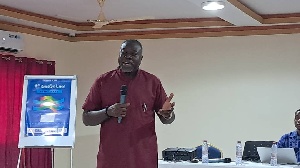Health News of Monday, 2 June 2025
Source: www.ghanawebbers.com
Prof Zottor urges journalists to lead public nutrition awareness in Volta and Oti regions
Prof. Francis B. Zottor, Director of AfriCAN and a certified nutritionist, spoke to journalists in the Volta and Oti Regions. He urged them to partner in advancing Ghana’s nutrition agenda. He encouraged them to reshape public understanding of nutrition through their platforms.
During a training session organized by the Nkabom Collaboration, he called the initiative a “game-changer.” It aims to unite education, research, and innovation against malnutrition. The program also seeks to create career opportunities for young professionals.
“Let down your head, relax, and forget where you’re coming from,” he advised journalists. He wanted them to leave with knowledge that could change their lives.
Prof. Zottor shared that Ghana was chosen for a pilot nutrition research project over Nigeria, Tanzania, and South Africa. He highlighted Ghana's reputation for integrity and hard work as key factors in this decision.
“They said Ghanaians are honest and diligent,” he noted. This is why the study began in February with local journalists.
The partnership involves the MasterCard Foundation and institutions like UHAS, KNUST, University of Ghana, COVET Technical University, and AGI. They have secured nearly $10 million for training experts in various fields related to nutrition.
Prof. Zottor emphasized shifting from producing unemployed graduates to nurturing job creators. “We’re tired of training students who join the unemployment queue,” he stated.
He provided examples of successful individuals like Delali and Selorm who are making an impact in their fields while pursuing further education.
“These students are system-ready and solution-driven,” Prof. Zottor explained.
The Nkabom collaboration is a 10-year initiative aiming to invest over $100 million into fighting malnutrition across Africa. Ghana will be a key hub for this effort.
“We need the media to report on nutrition issues effectively,” he stressed. The funding must build sustainable systems addressing food security, health, and livelihoods.
Prof. Zottor described journalists as “critical change agents.” He encouraged them to take ownership of the national nutrition narrative.
“You cannot just live to eat; you must eat to live,” he added. Journalists should empower others with their knowledge about nutrition.
This training is part of a larger goal: developing regional centers of excellence in nutrition and health sciences. It aims to deepen collaboration between academia, industry, and media professionals.
“This collaboration has come to stay,” Prof. Zottor concluded. He called for collective efforts to make Volta and Oti Regions leaders in nutrition excellence across Africa.











